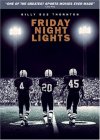BUY THE DVD:
|


|
|
|
SYNOPSIS:
| |
about the economically depressed town of odessa, texas and their heroic high school football team, the permian high panthers.
|
|
|
MOVIE FACT:
| |
frustrated with the authenticity of some actors playing assistant coaches, director peter berg' turned to actual permian high school coaches to deliver some lines during game sequences.
|
|
|
RATING:
|




four out of four possible stars
|
|
|
|
There's an old football saying that says, "Pain is temporary, pride is forever." This sentiment could certainly be applied to the rampant football fanaticism that haunts nearly every high school campus in Texas. Friday Night Lights is a spectacular display of that autumn intensity that grips the state by storm every single year. With Billy Bob Thornton in the lead role as "Coach Gary Gaines," and a group of intense young actors in the various roles of high school kids, the film is empty of any weak performance. Whether from lead actors or from supporting roles, the desperate and irrational demands made on high school football players is shown amply by every performer.
Despite his colorful off-screen life, actor Billy Bob Thornton proves with his every performance that he is one of the most powerful and dedicated actors working in Hollywood today. And his appearance in Lights is no exception. The cold irony of Coach Gaines' job as head coach of the Odessa, Texas high school football team is shown with both subtle humor and quiet intensity by Thornton. Despite the character's seemingly obligatory half-time pep-talks that populate the film (they are a required element of sports films, are they not?), Thornton adds much more dimensionality to what might have otherwise been a stock sports movie role.
In a key supporting position, actor Derek Luke, playing the bombastic town football star, "Boobie Miles," fills the shoes of the proud footballer with a welcome enthusiasm and offers a depth of character usually missing in many sports films. It always seems as though filmmakers are content to relay the facts and situations of a true-life story, but never give the characters more depth than a kiddie pool. The same cannot be said for this film. Every single character has a mountain of weight sitting on his or her shoulders, and beyond the strong performances from all actors involved, the cast benefits from a strong story and sturdy dialogue.
Another strong supporting performance comes from Lucas Black, who plays a capable player thrust into the spotlight in the middle of the season after the star quarterback's injury. Black spends much of the film playing the role with an intense stare, but he communicates well through both body language and the lines of dialogue given to him by the screenwriters (one of whom was the director of the film). Black's performance is especially rewarding at the very end of the film when his character has completed his last season of high school football and stands in the stadium parking lot, staring at a group of kids playing football in the dust. What Black communicates through his body language in that scene alone is worth the price of admission to this film.
Jay Hernandez, used far too infrequently in the recent Ladder 49, is again relegated to a more minor role than he deserves, but he makes a fine impression as player "Brian Chavez" nonetheless. Tim McGraw, in his first feature film appearance, makes quite a splash onto the screen as well, playing a drunken and abusive father to high school student, "Don," played by young newcomer Garrett Hedlund. Both of these rookie actors accomplish much more than would otherwise be expected of two so new to the screen.
There are a slew of additional micro-roles all cast very well, in which actors display the sometimes frightening enthusiasm Texas folks have for their beloved sport. And writer/director Peter Berg accomplishes something rarely seen in sports films and that is the showing of both the beloved and the bizarre of this game. Often a filmmaker will choose to show the audience only the horrors or only the benefits of a sport like this, but in this film Berg does both. The pressure these kids are under during their formative years is enough to make a grown man crack, but it is that pressure that chases them into adulthood.
This film is certainly not a beatification of the sport of football, but it's not a strict critique either. Viewers will arrive at the closing credits with a respect and disgust for the Texas population at large. It is a thin line between love and hate, but director Berg certainly accomplishes this angle, probably aided mightily by Buzz Bissinger, who wrote the novel upon which the movie is based. The surprising amount of comedy, regarding the value of football over education in sometowns, that infuses the screenplay is a welcome addition to the genre, as some sport stories are entirely too dour and unbelievably inspirational.
Capturing the desolation of the film's locale, the blunt visual style of director of photography Tobias Schliessler makes the wide, dusty spaces of West Texas stretch out to an infinity. The cinematographer's creativity goes much further than shot composition though, through his use of grainy, washed-out film stock thatís only highlights the otherworldly look of West Texas.
A decade or two ago, the Texas tourism department came up with a slogan for their advertising campaign that read, "Texas: It's like a whole other country." In many respects, those advertisers were right. With the passion that's put into football alongside the wilting budgets of music programs and education, the state of Texas, and more importantly, the institution of football, is displayed with an enthusiasm unmatched in any other U.S. state. This near insanity for sport is portrayed to exacting and beautiful perfection by the cast and crew of Friday Night Lights.
Review by Kelsey Wyatt.
| |
|